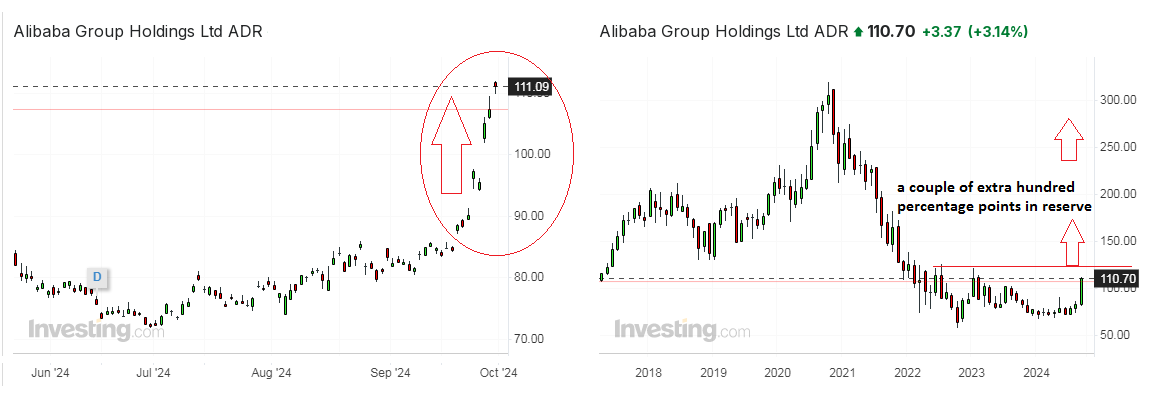Chinese Markets Took Heart
China's working to speed up stimulus, premier Li Qiang says. Beijing authorities are trying their best for the demand side and domestic consumption to come back. Besides lowering borrowing costs for businesses and consumer credits since 2021, unlike Western central banks, the People's Bank of China (PBoC) also coordinates its efforts to boost capital market funding and easing home-buying rules in megacities like Shanghai and Shenzhen. The integrated approach not only helps to revive the country's building industry but also may free up some householders' money to spend more for other purposes. As a result, as soon as Shanghai's property index bounced off its former trend, hopes for a holistic ending of Chinese economic slowdown quickly led to China's stock indices' rebound and to great China's ADRs leap on Wall Street.
Therefore, long-neglected shares of Alibaba Group BABA), JD.com (JD), Baidu (BIDU) and PDD Holdings (PDD) were eventually cleared for take off. In particular, Alibaba soared by more than 30% for the last 8 trading sessions, including +3% on today's opening, yet it has a couple of extra hundred percentage points in reserve for the case this high demand of Chinese stock would retain. Those China businesses are the top gainers on Wall Street in the second half of September, even overtaking big techs, consumer discretionary or U.S. rooted industrial stocks on a turn. Therefore, I am going to make at least 5% to 7% room for them in my portfolio. No more than that at the moment, as risks with Asian firms are also high, at least because of possible trade wars with the next White House administration if Republicans will sit there. Democrats are also not kind to the supply of technology solutions to China. However, E-commerce platforms that are focusing on non-U.S. sales should be least affected by any kind of cross-border or tax barriers.
What I also like is that Alibaba CEOs said last week that they will accelerate the AI push by releasing new open source text-to-video models. They are trying to compete in the generative AI area with US-rooted tech monsters. Alibaba said it is launching a hybrid model with both proprietary and open-source development to broaden its AI product range and to compete on the playground of giant players like OpenAI, a close partner of Microsoft, using from 0.5 to 72 billion parameters to determine an AI model's capability, also supporting for over 29 languages. Baidu is actually a Chinese "version" of Google, which looks like another promising direction for investments. The exact price targets cannot be determined yet, but this can be dealt with later when the deals with Chinese ADRs would start to bring at least some substantial profit... as I hope.
Chinese auto manufacturers like Nio (NIO) or Li Auto (LI), as well as casino operators like Wynn Resorts (WYNN) or Las Vegas Sands (LVS), which have a large presence in Chinese Macau, may also deserve some attention, yet give me more doubts in terms of continuous financial injection by the market community. I think I'll wait with this kind of stocks and think twice before putting my money in the segments.

Disclaimer:
The comments, insights, and reviews posted in this section are solely the opinions and perspectives of authors and do not represent the views or endorsements of RHC Investments or its administrators, except if explicitly indicated. RHC Investments provides a platform for users to share their thoughts on financial market news, investing strategies, and related topics. However, we do not guarantee the accuracy, completeness, or reliability of any user-generated content.
Investment Risks and Advice:
Please be aware that all investment decisions involve risks, and the information shared on metadoro.com should not be considered as financial advice. Always conduct thorough research, seek professional advice, and exercise caution when making investment decisions.
Moderation and Monitoring:
While we strive to maintain a respectful and informative environment, we cannot endorse or verify the accuracy of all user-generated content. We reserve the right to moderate, edit, or remove any comments or posts that violate our community guidelines, infringe on intellectual property rights, or contain harmful content.
Content Ownership:
By submitting content to metadoro.com, users grant RHC Investments a non-exclusive, royalty-free license to use, display, and distribute the content. Users are responsible for ensuring they have the necessary rights to share the content they post.
Community Guidelines:
To maintain a positive and respectful community, users are expected to adhere to the community guidelines of Metadoro. Any content that is misleading, offensive, or violates applicable laws and regulations will be subject to moderation or removal.
Changes to Disclaimer:
We reserve the right to update, modify, or amend this disclaimer at any time. Users are encouraged to review this disclaimer periodically to stay informed about any changes.









